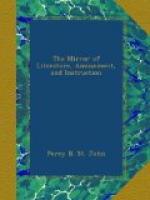[14] “The foregoing anecdote was told to the writer by the late James Burton, Esq., of Lockeridge House, a seat of the Marquess of Aylesbury’s, near Marlborough. Mr. Burton married a daughter of the celebrated actress, Mrs. Cibber, by General Sloper, a man of the highest fashion of his day, from whom, I believe, Mr. Burton received the account; the particulars of which, as I have narrated, no doubt, many persons of Mr. Burton’s acquaintance still remember.”
* * * * *
SPIRIT OF DISCOVERY.
ON THE POTATO.
BY T.A. KNIGHT, ESQ., F.R.S., PRES. HORT. SOC.
Mr. Knight is convinced by the evidence of experiments, “that the potato plant, under proper management, is capable of causing to be brought to market a much greater weight of vegetable food, from any given extent of ground, than any other plant which we possess.” There is no crop, he says, “so certain as that of potatoes; and it has the advantage of being generally most abundant, when the crops of wheat are defective; that is, in wet seasons.” The following observations are extremely interesting:—
“I think I shall be able to adduce some strong facts in support of my opinion, that by a greatly extended culture of the potato for the purpose of supplying the markets with vegetable food, a more abundant and more wholesome supply of food for the use of the labouring classes of society may be obtained, than wheat can ever afford, and, I believe, of a more palatable kind to the greater number of persons. I can just recollect the time when the potato was unknown to the peasantry of Herefordshire, whose gardens were then almost exclusively occupied by different varieties of the cabbage. Their food at that period consisted of bread and cheese with the produce of their gardens; and tea was unknown to them. About sixty-six years




